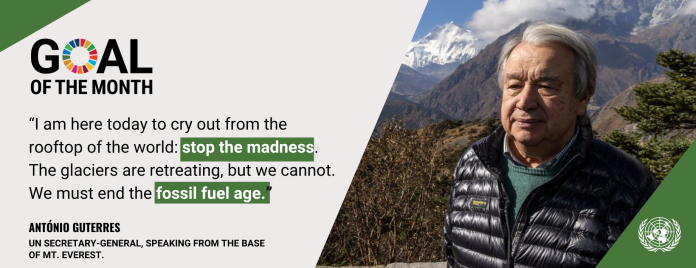Goal of the Month – Climate Action
“We can still limit the rise in global temperature to 1.5 degrees. We can still build a world of clear air, green jobs, and affordable clean power for all. The path forward is clear.” – UN Secretary-General António Guterres, Climate Ambition Summit, 20 September 2023
WHERE ARE WE
Every person, in every country, in every continent will be or is impacted in some shape or form by climate change. With rising greenhouse gas emissions, climate change is occurring at rates much faster than anticipated. If left unchecked, climate change will cause average global temperatures to increase beyond 3°C and will adversely affect every ecosystem and undo a lot of the development progress made over the years. Extreme weather events are displacing millions of people, the world is heating up, and out-of-control wildfires continue to cause death and destruction, from Canada to the Greek islands.
The Intergovernmental Panel on Climate Change (IPCC) emphasizes that deep, rapid and sustained reductions in greenhouse gas (GHG) emissions are crucial in all sectors, beginning now and continuing throughout this decade. In order to limit global warming to 1.5°C above preindustrial levels, emissions must already be decreasing and need to be cut by almost half by 2030 – this is just seven years away and unfortunately, we’re drastically off track from this target.
We need to raise ambition at all levels and transformation is needed across all sectors – industry, transport, forestry and agriculture. Solutions are available and investments in renewable energy have soared, but more needs to be done.
Read more about Goal 13: https://www.un.org/sustainabledevelopment/climate-change/
SDG 13 IN NUMBERS
- At the current rate, the world will exceed 1.5°C by 2035 and faces a 2.5°C warming by 2100.
- The rate of sea-level rise has doubled in the last decade.
- Global emissions must be halved by 2030, on the way to net-zero by 2050, but on current national plans, emissions are set to rise by 10%.
- Almost 30% of electricity globally comes from renewable sources today.
- The cost of electricity from solar power dropped by 85% over the last ten years.
- If we act now, climate change can be limited! From business, civil society, to individuals, solutions are available around the world to secure a livable, sustainable future for all.
IN FOCUS
30 Nov – 12 Dec | UN Climate Change Conference (COP28)

This year’s UN climate change conference (COP28) will take place from 30 November to 12 December in Dubai, United Arab Emirates. Against the backdrop of a worsening climate crisis, COP28 is a pivotal opportunity to take stock of progress toward meeting the goals of the Paris Agreement, correct course, and accelerate action to limit global warming to 1.5°C degrees and deliver climate justice to those on the frontlines of the climate crisis.
Learn more about the COP 28 thematic programme here: https://unfccc.int/cop28
The road to COP28
In the lead-up to COP28, the United Nations will issue a series of major reports on climate impacts and solutions:
- 2 November: UNEP Adaptation Gap Report
- 8 November: Production Gap Report by the Stockholm Environment Institute, UNEP and other partners
- 14 November: UNFCCC synthesis reports on Nationally Determined Contributions and Long-term Strategies, which will inform the global stock take at COP28
- 15 November: WMO Annual Greenhouse Gas Bulletin, which presents the latest data on greenhouse gas concentrations in the atmosphere
- 20 November: UNEP Emissions Gap Report
- 30 November: WMO’s provisional State of the Global Climate 2023 Report
Explore some more climate-related assets and feature stories here:
The heat is on

On 20 September 2023, the Secretary-General held the Climate Ambition Summit, a global movement for “first movers and doers” to showcase concrete, credible, and ambitious new actions to move forward across elements of the Acceleration Agenda. The Summit was also an opportunity to demonstrate that tangible and ambitious action to credibly cut emissions and deliver climate justice was possible and practical and inspire others to follow.
But the effects of climate change are already being felt across the world. According to the World Meteorological Organization (WMO), this September was the hottest one ever, putting 2023 on track to be the warmest year ever. This continues an extended streak of extreme land and sea-surface temperatures and a clear sign of the speed with which GHG’s are changing the climate.
The Secretary General’s recent trip to the Everest region in Nepal further emphasized the dire situation of climate impacts. Glaciers high in the Himalayas feed large river systems, sustain crops, livestock and local economies, in a region that is home to over 1.8 billion people. But with rising global temperature, ice is melting faster than ever, not only in the Himalayas but also in key areas like Greenland and Antarctica.
The incoming COP28 must deliver urgent progress on closing the emissions gap, phase out of fossil fuels, and accelerate transition on renewable energy to ensure that we fast track climate goals by 2030 and reduce the serious climatic impacts that we’ll be facing.
Climate mis- and disinformation
We have the knowledge and the solutions to tackle the climate crisis, but mis- and disinformation are major obstacles towards progress. Deceptive or misleading content distorts the truth, creates confusion, and can lead to delays in action or even harmful action. Resources to combat climate mis- and disinformation with reliable, science-based facts:

In a discussion Tackling mis/dis-information: An urgent frontier for action, the UN’s Senior Adviser on Information Integrity talked with three climate experts during the SDG Media Zone on the importance of tackling misleading facts about climate. As we tackle the climate crisis, it is crucial that we push back on harmful misperceptions that can stifle effective climate action.
Learn more about the story here, and check out other climate-related discussions held during the SDG Media Zone here.
HIGHLIGHTS
#ActNow for our Common Future

ActNow is the United Nations campaign to inspire people to act for the Sustainable Development Goals. The SDGs can improve life for all of us. Cleaner air. Safer cities. Equality. Better jobs. These issues matter to everyone. But progress is too slow.
We have to act, urgently, to accelerate changes that add up to better lives on a healthier planet. Whether small or big, everyone can take actions towards a more sustainable future and join the global movement for change. Learn more about the actions and activities you can take to reduce your impact on the environment.
In support of the ActNow campaign, the Climate Awards by Agora is inviting individuals and organizations around the world to share their best videos and photos showcasing projects, ideas, and action to tackle the climate crisis. Learn more about the Climate Awards challenge and see how you can participate here.
World Sustainable Transport Day

While transport is vital for promoting connectivity, trade, economic growth, and employment, it is also recognized as a significant source of green-house gas emissions. World Sustainable Transport Day, observed on 26 November, highlights the critical role that safe, affordable, accessible and sustainable transport systems can play in supporting economic growth, improving the social welfare of people and enhancing international cooperation and trade among countries.
Whether it’s for work or for pleasure, the choices we make on how we get from one place to another can have a large impact on carbon emissions. Learn more on how sustainable transport choices can help reduce carbon emissions and improve air quality!
State of the Food and Agriculture Report
FAO’s State of the Food and Agriculture report (SOFA 2023) focuses on uncovering the hidden impacts of our agrifood systems for informed decision-making. Launching on 6 November, the report aims to make the case for sweeping transformations of agrifood systems to advance the SDG agenda.
Relevant details for the report can be found here:
- Report eventual URL: https://www.fao.org/publications/home/fao-flagship-publications/the-state-of-food-and-agriculture/en
- Trello: https://trello.com/b/zVHQ94HD/the-state-of-food-and-agriculture-2023
- Interactive story: https://www.fao.org/state-of-food-agriculture/en/
Least Developed Countries Report
The annual UNCTAD LDC report provides a comprehensive and authoritative source of socio-economic analysis and data on the world’s most impoverished countries. Launching on 7 November, the 2023 report highlights that LDCs have very high external financing needs to pursue their path towards sustainable development. These have become even larger due to the emergence of multiple global crises.
The report is intended for a broad readership of governments, policymakers, researchers, and all those involved with LDCs´ development policies. Further details and the full report will be available here.
Related Explainers
Learn more about key areas related to the SDGs from the explainers below:




